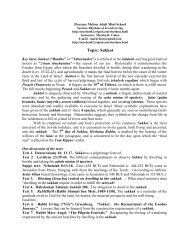The Religious Policy of Xerxes and the "Book of Esther"
The Religious Policy of Xerxes and the "Book of Esther"
The Religious Policy of Xerxes and the "Book of Esther"
You also want an ePaper? Increase the reach of your titles
YUMPU automatically turns print PDFs into web optimized ePapers that Google loves.
XERXES AND THE BOOK OF ESTHER-LITTMAN<br />
I55<br />
worship <strong>of</strong> Marduk. As Lewy notes,38 <strong>the</strong> Jews were affected<br />
by this action against priests <strong>and</strong> temples <strong>and</strong> compared <strong>the</strong><br />
acts <strong>of</strong> <strong>Xerxes</strong> to Nebuchadnezzar's destruction <strong>of</strong> <strong>the</strong>ir own<br />
temple. In <strong>the</strong> <strong>Book</strong> <strong>of</strong> Tobit 'Ascrpoq (<strong>Xerxes</strong>) was labelled a<br />
destroyer <strong>of</strong> Nineveh, while in Daniel 70 Bel's image is destroyed<br />
by <strong>the</strong> "King <strong>of</strong> Babylon".<br />
Many unanswered questions remain about <strong>the</strong> <strong>Book</strong> <strong>of</strong><br />
Es<strong>the</strong>r in regard to its origins, composition <strong>and</strong> literary merits,<br />
but it is beyond <strong>the</strong> scope <strong>of</strong> this paper to delve into <strong>the</strong>se<br />
aspects.39 What has emerged from this paper is <strong>the</strong> following:<br />
<strong>The</strong> <strong>Book</strong> <strong>of</strong> Es<strong>the</strong>r is set in <strong>the</strong> reign <strong>of</strong> <strong>Xerxes</strong>, who was<br />
heavily committed to Zoroastrianism <strong>of</strong> an orthodox variety<br />
<strong>and</strong> who reversed <strong>the</strong> practice <strong>of</strong> religious tolerance <strong>of</strong> his<br />
predecessors. He destroyed <strong>the</strong> main idol <strong>of</strong> Bel Marduk, <strong>the</strong><br />
temple <strong>of</strong> Marduk, Esagila, <strong>and</strong> many o<strong>the</strong>r Mardukian<br />
temples. <strong>The</strong>re was a temple <strong>of</strong> Ishtar <strong>and</strong> certainly worshippers<br />
<strong>of</strong> Marduk in Susa at this time. <strong>Xerxes</strong>' hostile policy<br />
toward Marduk <strong>and</strong> subsequent destruction <strong>of</strong> temples were<br />
motivated both by religious attitudes <strong>and</strong> policies <strong>and</strong> by<br />
political as well as financial expediency.40 Thus <strong>the</strong>re is a<br />
very strong probability that <strong>the</strong> religious persecution referred<br />
to in <strong>the</strong> <strong>Book</strong> <strong>of</strong> Es<strong>the</strong>r originally was not Persian against<br />
Jews, but Persians against <strong>the</strong> worshippers <strong>of</strong> Marduk during<br />
<strong>the</strong> reign <strong>of</strong> <strong>Xerxes</strong>.<br />
38<br />
Lewy, op. cit., I49.<br />
39 For <strong>the</strong> best general treatment <strong>of</strong> <strong>the</strong> <strong>Book</strong> <strong>of</strong> Es<strong>the</strong>r see Bickerman<br />
(note i above).<br />
40 H. Winckler, Altorientalische Forschungen III i (I902) 4, thinks<br />
<strong>the</strong> name Haman is identical to that <strong>of</strong> <strong>the</strong> Persian god Qaocvou,<br />
mentioned by Strabo. Though this would support my <strong>the</strong>sis, I feel<br />
no identification <strong>of</strong> Haman's name thus far is anything more than<br />
speculation. Benfrey <strong>and</strong> Scheftelowitz (as quoted in Lewy, op. cit.,<br />
I36) take <strong>the</strong> name to mean "<strong>of</strong>ferer <strong>of</strong> Haoma is <strong>the</strong> drink <strong>of</strong> Mithra<br />
worship (though it was drunk by <strong>Xerxes</strong>' court). This derivation<br />
seems little more than speculation with little linguistic justification.





